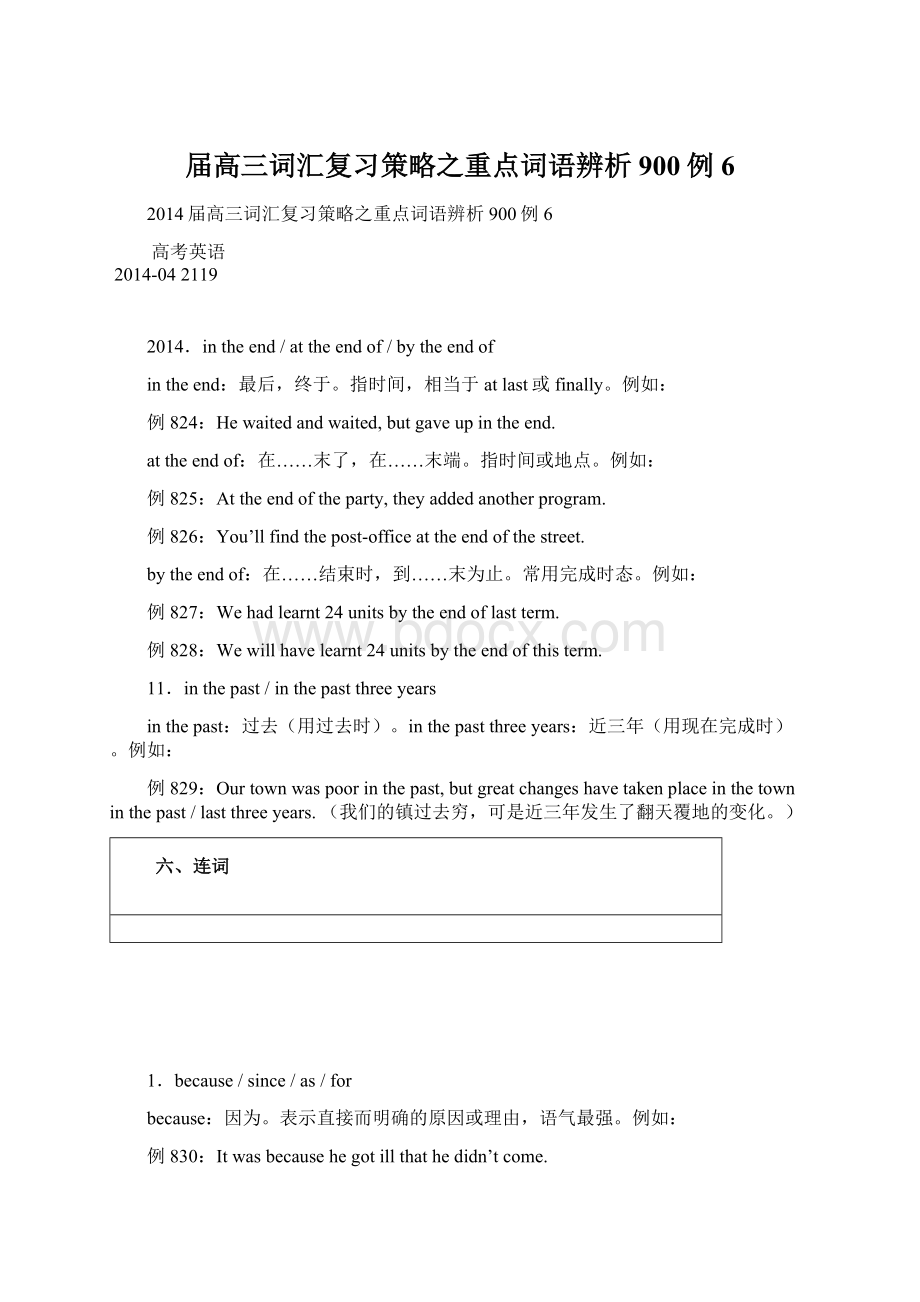届高三词汇复习策略之重点词语辨析900例6.docx
《届高三词汇复习策略之重点词语辨析900例6.docx》由会员分享,可在线阅读,更多相关《届高三词汇复习策略之重点词语辨析900例6.docx(8页珍藏版)》请在冰豆网上搜索。

届高三词汇复习策略之重点词语辨析900例6
2014届高三词汇复习策略之重点词语辨析900例6
高考英语
2014-042119
2014.intheend/attheendof/bytheendof
intheend:
最后,终于。
指时间,相当于atlast或finally。
例如:
例824:
Hewaitedandwaited,butgaveupintheend.
attheendof:
在……末了,在……末端。
指时间或地点。
例如:
例825:
Attheendoftheparty,theyaddedanotherprogram.
例826:
You’llfindthepost-officeattheendofthestreet.
bytheendof:
在……结束时,到……末为止。
常用完成时态。
例如:
例827:
Wehadlearnt24unitsbytheendoflastterm.
例828:
Wewillhavelearnt24unitsbytheendofthisterm.
11.inthepast/inthepastthreeyears
inthepast:
过去(用过去时)。
inthepastthreeyears:
近三年(用现在完成时)。
例如:
例829:
Ourtownwaspoorinthepast,butgreatchangeshavetakenplaceinthetowninthepast/lastthreeyears.(我们的镇过去穷,可是近三年发生了翻天覆地的变化。
)
六、连词
1.because/since/as/for
because:
因为。
表示直接而明确的原因或理由,语气最强。
例如:
例830:
Itwasbecausehegotillthathedidn’tcome.
since:
既然。
表示说话者和听话者双方都明白的原因,相当于nowthat。
例如:
例831:
Sinceyouseemypoint,let’sstartrightaway.
(既然你明白我的意思,那我们开始行动把。
)
as:
因为,既然。
语气不如because那么强。
例如:
例832:
Asheissomean,nobodyaroundlikeshim.(他吝啬,身边没有一个人喜欢他。
)
for:
因为。
语气最弱,只是解释性的,没有直接的因果关系;它是并列连词,不用于句首。
例如:
例833:
Itmusthaverained,fortheroadiswet.(想必下过雨了,因为道路湿着呢。
)
2.if/whether
if和whether都有“是否”的意思。
whether可以引导主语从句、宾语从句、表语从句和同位语从句,if则只能引导宾语从句且不放在句首;whether后可以接todo结构,if则不可以。
另外,if有“如果”的意思,引导状语从句。
例如:
例834:
Whethertheywillcomeontimeisstillunknown.
例835:
Wedon’tknowwhether/iftheywillcomeontime.
例836:
Wedon’tknowwhethertocomeornot.
例837:
Iftheycome,we’lltellyouatonce.(如果他们来了,我就马上告诉你。
)
3.though/although/eventhough/asthough
though:
虽然(用作连词,引导状语从句;也可用在倒装结构中);然而(用作副词,一般放在句末)。
例如:
例838:
Thoughitwasverylate,hewentonworking.
例839:
Youngthough/asheis(=Thoughheisyoung),heknowsalot.
例840:
Hesaidhewouldcome,hedidn’t,though.
although:
虽然。
不用作副词,不用在倒装结构中。
例如:
例841:
Althoughitwassocold,hewentoutwithoutanovercoat.
例842:
Heisquitestrong,althoughveryold.
eventhough:
即使。
等于evenif。
例如:
例843:
Iwouldn’tattendhisparty,eventhoughinvitedto.
asthough:
好像。
等于asif。
例如:
例844:
Herunsasthoughheweremad.(他跑起来像发疯似的。
)
4.when/while/as
when:
当或在……的时候。
从句中的动作可以表示某一段时间或某一时刻。
例如:
例845:
Whenwewereatschool,wewenttothelibraryeveryday.
例846:
Itwasrainingwhenwearrived.
while:
当或在……的时候。
表示主句中的动作在从句中的动作的进展过程中发生,只能指某一段时间。
例如:
例847:
Pleasedon’ttalksoloudwhileothersareworking.
as:
当或在……的时候。
往往可与when或while通用,但它着重指主句和从句中的动作同时发生,有“一边……,一边……”含义。
例如:
例848:
Thechildrensanghappilyastheywentalongtheroad.
七、代词
1.比较几组不定代词
两 者
三者或三者以上
都,全部
both
all
都不,全部不
neither
none
任一
either
any
另一
theother
another
每一
each(或两者以上)
every
相互
eachother(或两者以上)
oneanother
例849:
—Whichofthetwotieswillyoutake?
—I’lltakeboth,togivemeachangesometimes.
例850:
—WillBillandTombeheretomorrow?
—I’mafraidneither,theyhaveaskedforleave.
例851:
Therearegreentreesoneachsideoftheroad.(=eitherside,bothsides)
例852:
—Whatwouldyoulike,coffee,cokeortea?
—AnyisOK.
2.each/every
each和every都是“每一”的意思。
each强调个体,every强调全体;each可以接“of”结构,可以在句中充当同位语,every则不可以;each指两个或两个以上的人或事物,every指三个或三个以上的人或事物;every有“每隔……,每……”之思,each则没有。
例如:
例853:
Eachhashisgoodpoint.
例854:
Eachofthemhashisowndictionary.
例855:
Thestudentseachhaveadesk.(此处each是thestudents的同位语。
)
例856:
Iknoweverymemberofyourfamily.
例857:
Wehandinourhomeworkeverythreedays.(相当于everythirdday。
)
3.none/noone
none与noone都是“没有”的意思。
none表示人或物,可接of短语;noone只表示人,不接of短语。
例如:
例858:
—Howmanystudentsarethereintheclassroom?
—None.(没有学生,表示有特定对象“学生”。
)
例859:
—Whoisintheclassroom?
—Noone./Nobody.(没有人,表示没有特定对象。
)
同样情况也存在于none与nothing的比较:
例860:
—Howmanypensarethereinthebox?
—None.(没有钢笔)
例861:
—What’sinthebox?
—Nothing.(什么也没有)
例862:
Noneofthemwantstogo.(此处none不用noone替代。
)
例863:
Everyoneofus/Everyonehasachancetotryasecondtime.
4.nothingbut/anythingbut/nobodybut/anybodybut
nothingbut:
只有,只是。
其后接事物或人。
例如:
例864:
Nothingbutapenandabookisonthedesk.
例865:
Heisnothingbutanassistant.(他不过是助手。
)
anythingbut:
决不。
其后接事物或人。
例如:
例866:
Iwilleatanythingbutpork.(我决不吃猪肉。
)
例867:
Sheisanythingbutagoodguide.(她决不是好向导。
)
nobodybut:
只有。
其后接人。
例如:
例868:
NobodybutJohnandPeterhasknownit.
anybodybut:
决不。
其后接人。
例如:
例869:
IwouldbelieveanybodybutJim.(我决不信吉姆。
)
注意:
nothingbut和nobodybut当主语时,其谓语通常用单数形式。
5.one/that/it
one,that和it都有“那个”的意思。
one是不定代词,相当于“a+名词”,其复数形式是ones;that是指示代词,相当于“the+名词”,其复数形式是those;it是人称代词,指代前文提及的那件事、那个物(是唯一的)。
例如:
例870:
Iamlookingforahouse,andIwantonewithasmallgarden.
(one=a+名词,指代一幢房屋。
)
例871:
TheweatherinhereisbetterthanthatinXi’an.
(that=the+名词,指代西安的气候。
)比较:
例872:
Thestudentsinourclassaremorehardworkingthanthoseinanyoftheotherclasses.
(those=the+名词复数,指代学生。
)
例873:
Thisisthelastrecorderintheshop.Let’sbuyit.
(it指代前文提过的那个物,即最后一台录音机。
)
6.other/others/theother/theothers/another
例874:
Somepeoplelikebasketballwhileotherslikefootball.(=otherpeople,other作主语。
)
例875:
Thirtystudentsinourclassareboysandtheothersaregirls.
(=theotherstudents,others作主语。
)
例876:
I’vegottwoball-pointpens.Oneisblueandtheotherisred.
(theother作两者当中的另外一个解,可作主语。
)
例877:
Therearefourforeignersinourclass.OneisfromtheUnitedStatesandtheotherthreearefromJapan.
例878:
Idon’twantthispen.Pleaseshowmeanother.(another指三支笔以上的另外一支。
)
例879:
Weneedanothertenpeopletohelpus.
(another作“又、再”解,我们再需要十个人来帮忙。
)
例880:
Weneedtenother/morepeopletohelpus.
7.some/any
例881:
He’llbebackhereverysoonforsomereason(s).(some在肯定句中表示某些或某一)
例882:
Wouldyoulikesometea?
(some在疑问句中表示建议、诚意或愿望等。
)
例883:
Won’tyoutrysomerice?
例884:
Idon’thaveanychangeonme.(我身上没带零钱。
any用于否定或疑问句。
)
例885:
Ifyouhaveanyquestion,pleaseraiseyourhandfirst.
(如有问题,请举手。
any用于if从句中。
)
八、冠词
1.gotoschool/gototheschool
例886:
LiHuawenttoschoolatseventhismorning.Anhourlater,hisfatheralsowenttotheschoolforameeting.(李华今天早上7点上学,一小时后他父亲也去了学校,要开会。
)
2.gotochurch/gotothechurch
例887:
WehadtogotothechurchtogetJoan,whowenttochurchwithouthercellphone,foritwasurgent.(我们只好去教堂叫琼,她去礼拜,没有带手机,事情又紧急。
)
3.beinhospital/beinthehospital
例888:
IamgoingtothehospitaltoseeTom,forheisinhospital.
(我要去医院看汤姆,他在住院。
)
4.infrontof/inthefrontof
例889:
Infrontofourhouse,thereisatheatre.Ilikesittinginthefrontofthetheatrewhenenjoyingaplay.(我家房前有个剧院,看戏时我喜欢坐前排。
)
5.inchargeof/inthechargeof
例890:
—IsSmithstillinchargeoftheproject?
(史密斯还负责这个项目吗?
)
—No,it’snowinthechargeofJackson.(没有,该项目现在由杰克逊负责。
)
6.inpossessionof/inthepossessionof
例891:
Jacksonusedtobeinpossessionofthecompany,butnowitisinthepossessionofhisson.(杰克逊以前拥有该公司,现在公司由他儿子拥有。
)
7.incaseof/inthecaseof
例892:
You’dbettertakeanumbrellaincaseofrain.(你最好带雨伞,万一下雨。
)
Money,inthecaseofJane,meanseverything.(钱对简来说意味着一切。
)
8.incourseof/inthecourseof
例893:
Theclassroombuildingisincourseofconstruction.(教学楼正在修建中。
)
Inthecourseoftheclass,hefellasleep.(他在上课过程中睡着了。
)
9.byroad/bytheroad
例894:
Didyoucomebyroad?
It’snotsafeforyoutoparkyourcarbytheroad.
(你坐车来吗?
把车停在路旁不安全。
)
2014.byhand/bythehand
例895:
Thiswasdonebyhand.(这是手工完成的。
)
Theyoungmantooktheblindmanbythehand,leadinghimacrossthestreet.
(那年轻人拉着盲人的手,带他过马路。
)
11.byday/bytheday
例896:
Weusuallyworkbyday,andgetpaidbytheday.(我们通常白天工作,按日计酬。
)
12.onwatch/onthewatch
例897:
Iwillbeonwatchtonight.(今晚我值班。
)
Thepolicewereonthewatchforthecriminal.(警察在看着罪犯。
)
13.outofquestion/outofthequestion
例898:
—Canyoudoit?
(你会做吗?
)
—Outofquestion!
(没问题!
)
—Trytofinishitwithintwohours.(尽量在两小时内完成。
)
—Outofthequestion!
(不可能!
)
14.threeofus/thethreeofus
例899:
Threeofusaregoing.(我们中有三个人要去。
)
Thethreeofusaregoing.(我们这三个人都要去。
)
15.theredandwhiteT-shirt/theredandthewhiteT-shirts
例900:
TheredandwhiteT-shirtiscostly.(那条红白相间的T恤很贵。
)
Theredand
thewhiteT-shirtsarecostly.(那些红色和白色的T恤都很贵。
)